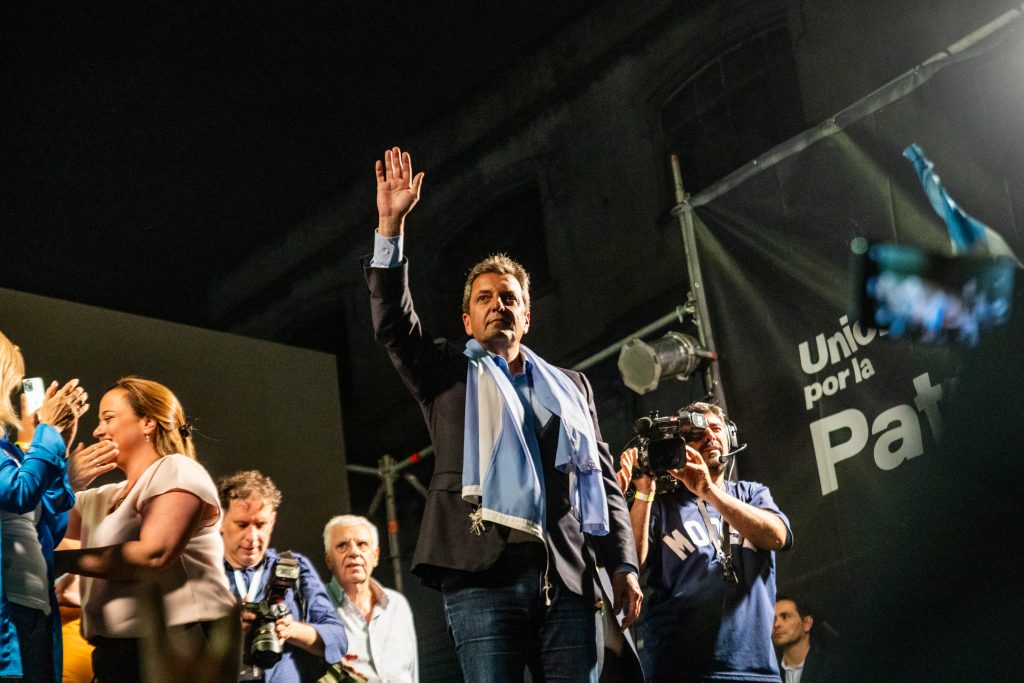Argentina’s Presidential Election: Massa, Milei and the Coming Runoff
Argentina is set to hold the second round of its presidential election on November 19. Even if the results should be less contradictory this time, the political outlook stays grim.
On 22 October, Argentines voted to elect a new president, half of the Chamber of Deputies, one-third of the Senate, and a few provincial governors. The Minister of Economy, Sergio Massa, candidate of the ruling Peronist coalition Unión por la Patria, won most of the votes (36.68 percent), followed by the libertarian economist and right-wing outsider Javier Milei (29.98 percent). The two candidates will face each other in a runoff on 19 November. Patricia Bullrich, candidate from the center-right coalition Juntos por el Cambio came in third with 23.83 percent of the votes, thus failing to advance to the runoff.
This is Argentina’s tenth consecutive democratic presidential election. 2023 marks the 40th anniversary of the election of President Raúl Alfonsín (1983–1989), the first to be elected since Argentina’s transition to democracy. Prior to this, Argentina had been under a military dictatorship (1976-1983). As the Bertelsmann Stiftung’s Transformation Index (BTI) states very accurately, the commitment to democratic institutions has persisted over the years, despite weaknesses, particularly in terms of checks and balances. However, the prospects look gloomy in what should be a year of civic celebration.
Inflation, radical cuts and the rise of populism
Elections are taking place within a serious economic context, with the monthly rate of inflation reaching double digits since August 2023 (the inter-annual one currently at 138%) and the poverty rate having touched 40.1 per cent in in the first half of 2023. The incapacity to stabilize their own currency in the long run and to eradicate the pernicious impact that inflation has on the less-advantaged sectors of society is obscuring the achievements of this young democracy that set a global example on other fronts, such as the remarkable trials of military officers for crimes against humanity in the early 1980s.
No wonder that people’s concerns in the electoral race are mainly about the economy. But disenchantment with politics and politicians has brought an anti-establishment candidate to the final run. Javier Milei voiced the frustration of million Argentines with an extravagant style and a radical discourse that speaks on exactly what they are fed up with: inflation and politicians.
Two Paradoxical Outcomes
This frustration has led to paradoxical outcomes in the elections. The most obvious is that the Minister of Economy, the minister of a ruined economy, came first in the polls. To understand this, one needs to consider that the great Peronist family comprises many factions. Massa has made the effort to stress, certainly with success, that he does not belong to kirchnerismo and that his government will be a new start. This resonates as credible to the electorate because Peronism has swung from the center-right government of Carlos Menem in the 1990s, to the center-left of Kirchner in the 2000s. In other words, their leadership knows how to adapt to the challenge of the time. In addition, the prevalence of the Peronist political machinery in the densely populated Buenos Aires province cannot be underestimated. In fact, Peronism also retained the governorship of this province on 22 October, despite serious corruption scandals exploding in this district a short time before the election.
Another paradox is that, even though the majority of the population (54%) opted for the two main opposition alternatives, Milei’s emergence divided the opposition front, thus causing the ruling party to prevail in the first round. The established center-right opposition Juntos por el Cambio had held a painful internal contest to define its presidential candidate. But the victory of the right-wing candidacy of Patricia Bullrich in those primaries penalized the most progressive and moderate voices. In the end, the alliance’s policy offer confounded with the far-right candidate’s economic agenda.
Whatever the outcome, the outlook is cloudy
Milei is an uncertain and risky option that fuels the economic fire with extreme and controversial policy proposals. He suggests a liberal economic program with radical cuts in expenses and taxes as well as extensive deregulations and privatizations. His plan to stabilize the economy consists of its dollarization and the closing of the Central Bank. His running mate Victoria Villarruel goes even further and proposes to revise the until now unquestioned pillar of Argentine democracy – namely, military policy based on the historical trials on crimes against humanity, as well as other long-term policy achievements, such as public health and education, and recent ones, such as women’s right to safe abortion.
In addition, Milei’s new party has no more than a handful of legislators in each congressional chamber and no one in the subnational authorities – a difficult political landscape for a program of radical change. He might get partial support from Juntos as there was a recent rapprochement between Milei and Macri (and Bullrich). At the same time, this alliance is heavily divided, so institutional conflict and deadlock are quite likely under a Milei presidency.
If Massa, on the other hand, could claim the victory and dismiss the old, losing Peronist factions, it would give him significant institutional resources at the national and subnational level. And yet, unpopular economic measures are unavoidable in the country’s difficult economic situation.
Stormy clouds await the political sky in Argentina in either case.
A version of this article was first published by the Fair Observer

